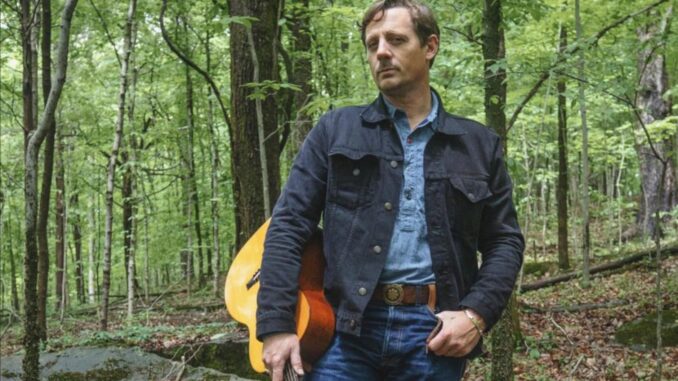
Review by AVA LIVERSIDGE
Roots revivalist Sturgill Simpson makes a return to music as Johnny Blue Skies on comeback record Passage du Desir via High Top Records.
Simpson was first able to distinguish himself in the over-saturated pool of Nashville country artists by aligning with the subdued Townes Van Zandt-Waylon Jennings Outlaw Country tradition, resisting his contemporaries’ inclinations to modernize or genre-bend. His 2016 LP A Sailor’s Guide to Earth earned him Best Country Album at the 59th Grammys, casting another vote of confidence in his hazy, lazy southern rock.
Since his early success, Simpson has explored myriad projects, all leaning into alternative iterations of purist country, though he most often explored the psychedelia that tinged the country rock of the early 70s. Detours have also included prog rock, bluegrass, and, of course, cosmic country. Following his 2021 record The Ballad of Dood & Juanita, a narrative concept album that doubles as a romantic epic, Simpson disappeared, and has yet to return. In his stead, Johnny Blue Skies (Simpson’s pseudonym) made his debut on LP Passage Du Desir, a downtrodden honky tonk collection embellished by a low-hanging curtain of psych-rock reverb.

Tracks “Who I Am” and “Swamp of Sadness” have a stilted, old country inertia emphasized by weeping fiddle interludes. Simpson’s vocals remain sweet, perhaps a bit pining, but without airs or exaggeration. “Jupiter’s Faerie” and “If the Sun Never Rises Again” are uncomplicated, Sunday morning heartaches where John Mayer meets the Allman Brothers. Passage du Desir thrives on its simplicity.
Obligatory twelve-bar-blues “Scooter Blues” offers us some idea of what Simpson has been up to during his musical hiatus, though I read this ode to post-5pm-kick-back-with-a-beer-in-hand as a somewhat sardonic take on the Zac Brown Band country archetype. That is, the bluesy jaunt is a bit out of place on a record best characterized as forlorn.
The nine-minute “One For The Road” makes a balladic closer of a break up song, one particularly tragic in its resignation. The eight track collection steeps itself in nostalgia. Johnny Blue Skies mourns his own memories without feeling sorry for himself, in the way that all outlaw country worth its salt does.

